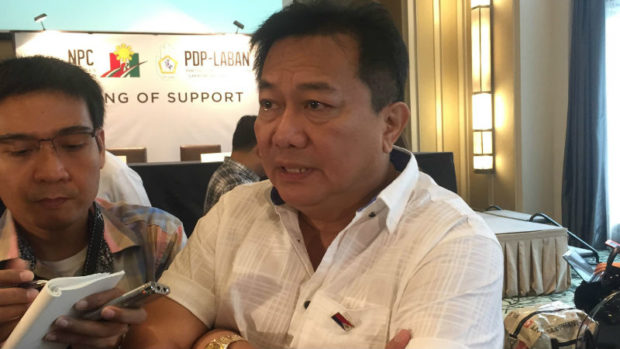‘Death penalty back in one year’

Incoming Davao Del Norte Rep. Pantaleon “Bebot” Alvarez. Marc Jayson Cayabyab/INQUIRER.net FILE PHOTO
Applicants for jobs in the incoming Duterte administration should include potential hangmen. Plenty of them.
Successful applicants can expect to be busy a year after being hired, as the expected next Speaker of the House of Representatives, Davao del Norte Rep. Pantaleon Alvarez, estimates the restoration of the death penalty to take only a year after presumptive President-elect Rodrigo Duterte assumes office on June 30.
The revival of capital punishment is one of the top priorities of Duterte, who was elected on an anticrime platform, with a promise of wiping out criminality within three to six months of assuming the presidency.
Duterte has said he will hang criminals convicted of two heinous crimes twice: once to kill them, then again to “completely sever the head.”
“There will be changes for the country as promised in the campaign. There are gargantuan tasks ahead of us,” Alvarez, Duterte’s right-hand man in the House, on Wednesday told a gathering of representatives from the Northern Luzon Alliance who had pledged to support the incoming administration.
Article continues after this advertisement“First of all is the advocacy of the incoming President to change the form of government from unitary to parliamentary system,” he said.
Article continues after this advertisementSecond priority
“Second on the agenda is the restoration of the death penalty. I know there will be opposition. But that is the beauty of democracy—we can discuss our views. At the end of the day, still the majority prevails,” he said.
Alvarez, the PDP-Laban secretary general, later told reporters that he was confident that the death penalty would be passed by the 17th Congress.
“Within a year, we will strive to do it. We will make an effort to make it happen,” Alvarez said.
The Roman Catholic Church, Commission on Human Rights and various groups have expressed objection to Duterte’s plan, saying capital punishment is contrary to the rehabilitative purpose of criminal justice, does not deter crime, and unequally applied on the poor.
Amnesty International Philippines also said bringing back the death penalty would be an embarrassment, as the country was a party to the Second Optional Protocol to the International Covenant on Civil and
Political Rights, which was aimed at the abolition of the death penalty throughout the world.
Duterte has swatted aside all objections, insisting on a merciless campaign against crime.
In comments to reporters in Davao City on May 16, he said he would ask Congress to reimpose the death penalty for a wide range of crimes, including drug trafficking, rape, murder, robbery and kidnapping for ransom.
Executions by hanging
Duterte said he preferred executions by hanging than musketry because he did not want to waste bullets, and because he believed snapping the spine with a noose was more humane.
He said he would use the military in the campaign against crime and he would give “shoot-to-kill” orders for those involved in organized crimes or those who would resist arrest.
“I need military officers who are sharpshooters. It’s true. If you (criminals) fight, I will have a sniper shoot you,” he said.
During the campaign, Duterte promised mass killings under his presidency.
He said he would kill tens of thousands of suspected criminals and dump their bodies in Manila Bay, where the fish would grow fat from feeding on the corpses.
On the plebiscite for the shift to federalism, Alvarez said the target was to hold it at the same time as the midterm elections in 2019.
He said there would also be a “major revision of the National Internal Revenue Code.”
“Reduction of taxes for the poor, increase for the rich. But [the actual numbers are] up to Congress’ computation,” Alvarez said.
During the meeting with the Northern Luzon Alliance, Alvarez also mentioned plans to amend the juvenile delinquency law, ease Metro Manila traffic and end insurgency.